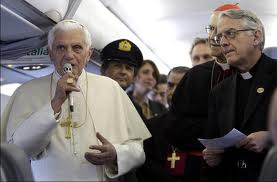
Catholic news - The Pope called upon the Christians in the Middle East to help create peace in their often troubled countries. “I exhort all Christians of the Middle East, both those born there and the newly arrived, to be builders of peace and architects of reconciliation,” said the Pope at the Vatican Sept. 12. “Let us pray to God that he may fortify the faith of Christians in Lebanon and the Middle East, and fill them with hope.”
Only 48-hours before his Apostolic Visit to Lebanon begins, Pope Benedict XVI has called upon the Christians of the Middle East to help create peace in the troubled region. “I exhort all Christians of the Middle East, both those born there and the newly arrived, to be builders of peace and architects of reconciliation,” the Pope said at the conclusion of his General Audience at the Vatican Sept. 12. “Let us pray to God that he may fortify the faith of Christians in Lebanon and the Middle East, and fill them with hope.” The Pope is making the 3-day trip to the Mediterranean state Sept. 14 - 16 to sign his Post-Synodal Apostolic Exhortation on the Church in the Middle East.
He flies into a region, though, which is still a state of often violent flux following several years of anti-government uprisings known as the “Arab Spring.” In Lebanon’s neighboring country of Syria tens of thousands of lives have been lost since an armed revolt against President Bashar al-Assad got underway in March 2011. The United Nations refugee agency estimates that nearly 250,000 Syrians have now fled to surrounding nations including Lebanon. Meanwhile in the wider Arab world, both Egypt and Libya have witnessed anti-American riots in recent days leading to the killing of the United States Ambassador to Libya, Christopher Stevens, in the city of Benghazi Sept. 11. The violent protests were sparked by the posting on YouTube of extracts of a low-budget US film mocking the Prophet Mohammed, the founder of the Islamic religion.
“The history of the Middle East teaches us the important and sometimes primordial role played by the various Christian communities in inter-religious and inter-cultural dialogue,” observed Pope Benedict.
“Let us ask God to give that region of the world its longed-for peace, and respect for legitimate differences.”
The Pope’s Post-Synodal Apostolic Exhortation is a response to the deliberations of the Synod of Bishops of the Middle East held at the Vatican in October 2010. The topic for discussion then was “The Catholic Church in the Middle East: Communion and Witness.”
He thanked God for the presence of Christian in the Middle East, where they often face persecution, and called upon the entire Church “to show solidarity, that they may continue to bear witness to Christ in those blessed lands, seeking communion in unity.”
He also rejoiced that his apostolic trip will enable him to meet members of Lebanese society including other Christians, Muslims and Druze from the region.
“I thank the Lord for this rich variety, which will be able to continue only if people live in permanent peace and reconciliation.”
Tags: Pope Benedict, Middle East, Violence
.- The Vatican voiced its “firmest possible condemnation” of the fatal attack on the U.S. diplomatic mission in Benghazi, Libya, which killed four Americans including the ambassador to the country. “Nothing, in fact, can justify the activity of terrorist organizations and homicidal violence,” read the statement issued by Vatican spokesman Fr. Federico Lombardi S.J. Sept. 13. “Along with our sadness, mourning and prayers for the victims, we again express the hope that, despite this latest tragedy, the international community may discover the most favorable ways to continue its commitment in favor of peace in Libya and the entire Middle East.”
Ambassador J. Christopher Stevens was killed Tuesday Sept. 11 in a fire started after the U.S. consulate in Benghazi was stormed by violent mobs. The 52-year-old, who was a native of California, had been a career diplomat with the U.S. Foreign Service since 1991. United States officials are now investigating whether the attack was planned by militant jihadist groups. The violence was sparked by the posting on YouTube of extracts of a low-budget U.S. film mocking the Prophet Mohammed, the 6-7th century founder of Islam.
Similar scenes of unrest have now been witnessed across North Africa and the Middle East, most notably in Yemen and Egypt. In the Yemeni capital of Sanaa Sept.13 demonstrators stormed the grounds of the US embassy and burned the American flag before being driven back by security forces. Reports of protests are also emerging from Tunisia, Sudan and Morocco.
Fr. Lombardi’s comments come on the eve of Pope Benedict XVI’s Apostolic Visit to the Middle East. The Pontiff is making a 3-day trip to Lebanon Sept.14 – 16 to sign his Post-Synodal Apostolic Exhortation on the Church in the region.